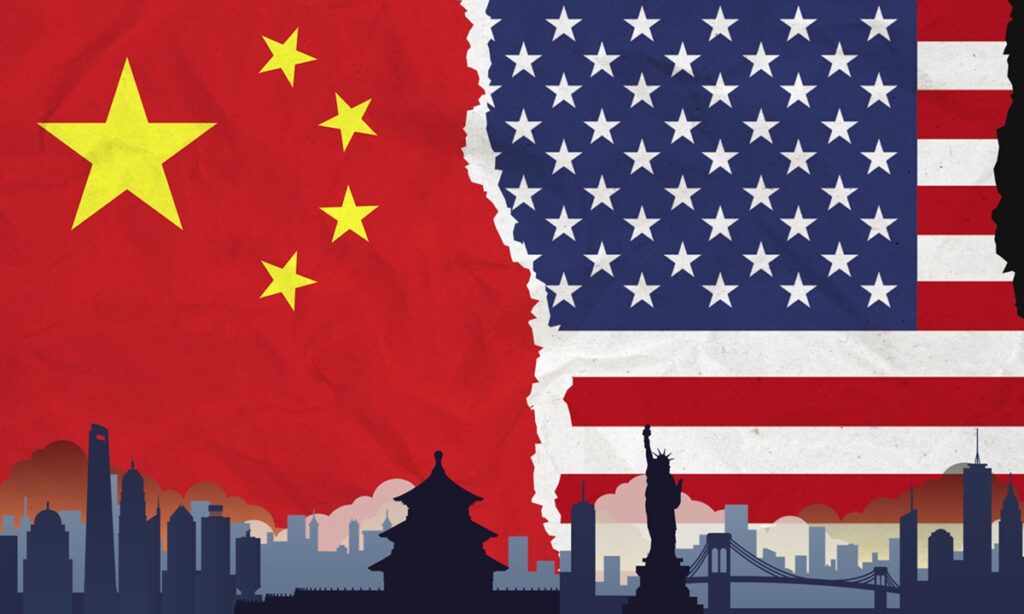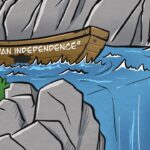China’s Ministry of Commerce (MOFCOM) on Thursday reaffirmed the country’s commitment to green development and slammed “certain countries and regions” mulling to take restrictive measures against Chinese electric vehicles (EVs), in response to reports of a prominent Chinese expert calling for a temporary tariff hike on imported cars with large engines.
The remarks marked a sharpened response to the US and the EU’s crackdown measures against Chinese EVs and other new-energy products, as Washington has set a date for imposing tariff increases on a slew of Chinese products and US officials are actively and publicly demanding US allies, particularly the EU, to follow suit.
Chinese officials have repeatedly vowed to take all necessary measures to defend China’s interests. And experts said that when the US actually imposes the tariff moves and if the EU would do the same, China will definitely take countermeasures, though the specific moves and their scopes remain to be seen.
At a press briefing on Thursday, He Yadong, a MOFCOM spokesperson, was asked whether he could confirm a media report that China is considering raising the temporary tariff rate on imported cars with engines larger than 2.5 liters and if such a move is a retaliation against the moves by the EU and the US, the spokesperson did not offer a direct response.
“China is firmly committed to the path of green and low-carbon development, and it has always encouraged and supported the green and low-carbon transformation and upgrading of various industries to achieve high-quality development,” He said.
He further noted that experts in all industries, including the auto industry, are engaged in research on China’s green development path and make recommendations for tackling global climate change.
In an exclusive interview with the Global Times published on Tuesday, a prominent expert in China’s auto industry who has participated in drafting various industrial policies suggested that China consider raising temporary tariff rates on cars with engines larger than 2.5 liters, as part of a broad effort to promote green development.
As the move is widely anticipated to have a major impact on auto imports from the EU and the US, many Western media outlets have interpreted the suggested move as Beijing’s response to Washington’s move to hike tariffs on Chinese EVs and other new-energy products and the EU’s so-called anti-subsidy probe into Chinese EVs, which could also lead to tariff hikes.
Responding to the same question, He also slammed the restrictive moves against Chinese EVs.
“What I want to emphasize is that some countries and regions are currently deviating from the concept of green development, violating the principles of the market economy and WTO rules, and introducing restrictive measures in the field of new-energy vehicles,” He said.
Such moves will only harm the interests of their own consumers and undermine the global green transition and the world’s capacity to tackle climate change, the MOFCOM spokesperson said.
The remarks came after the US announced on Wednesday US time that it will start imposing increased tariffs on an array of Chinese products, including EVs, EV batteries, semiconductors and medical products on August 1. While US officials previously announced the tariff hikes, this is the first time the US has revealed explicitly the date when the tariff increases will take effect.
Chinese experts said China will not sit idly by if its legitimate rights and interests are harmed by other countries, and China will, without any doubt, take countermeasures to defend its rights and interests.
“China has repeatedly warned the US against taking such a move and called for addressing differences through cooperation. But the US has shown no sincerity. So, if it doesn’t heed such calls, China will take countermeasures as it did in 2018,” Bai Ming, researcher of Chinese Academy of International Trade and Economic Cooperation, told the Global Times on Thursday, referring to China’s reciprocal tariff hikes in response to the tariff war that the US launched against China.
Countermeasures
“China will fight back,” Gao Lingyun, an expert from the Chinese Academy of Social Sciences who closely follows China-US economic and trade issues, told the Global Times on Thursday, noting that the specific measures and the scope remain to be seen.
Some Chinese experts said there are several steps China can take in a proportionate manner that is also in line with international trade rules. First, China could file a complaint with the WTO, as previously ruled against the US moves, and relevant firms, including those from China, could file lawsuits against the US. However, such moves are unlikely to resolve the issues in the short term, “so other countermeasures must also be prepared,” Bai said.
Some experts also suggested that given the negative impact of Washington’s moves on global green, low-carbon development and efforts to tackle climate change, there are serious questions about its commitment in the area – as such, relevant cooperation should also be reviewed.
Highlighting the global implications of Washington’s toxic policies, in addition to its own tariffs, US officials have also been stepping up pressure on US allies, including the EU, to follow suit in cracking down on Chinese EVs. Brussels has launched a so-called anti-subsidy investigation into Chinese EVs, which could lead to hiked tariffs. On Thursday, US Treasury Secretary Janet Yellen said G7 finance ministers will discuss China’s “excess industrial capacity and potential responses,” Reuters reported.
Chinese experts said that while the current US administration also followed the previous administration’s wrong path of engaging in a tariff war, its approach is a little different in that it seeks to pressure allies to follow its suit. However, US allies have different interests to consider, when it comes to actually taking harmful measures, even though they are under great pressure to heed the US’ commands, experts noted.
“For example, when it comes to the car industry, there are greatly intertwined interests between China and the EU. Many Chinese car exports contain EU components or technologies, so EU companies also profit from China’s car exports,” Gao said, noting that any move taken by EU authorities will likely be temporary and limited in scope.
Moreover, any temporary adjustments on tariffs on large-engine cars could also have a major negative impact on EU carmakers, as many luxury sedans and sports utility vehicles that have engines larger than 2.5 liters in China are imported from EU countries, such as Germany, according to experts.
(Global Times)




